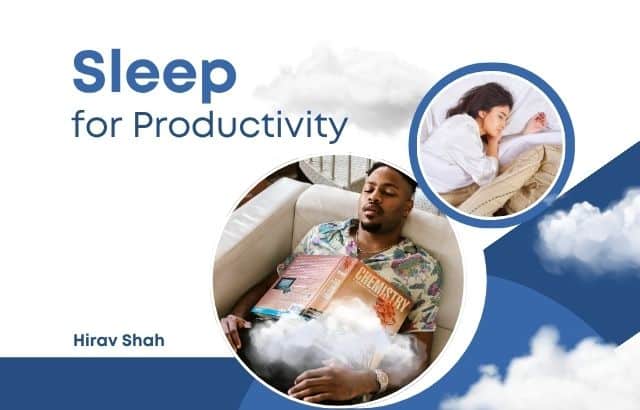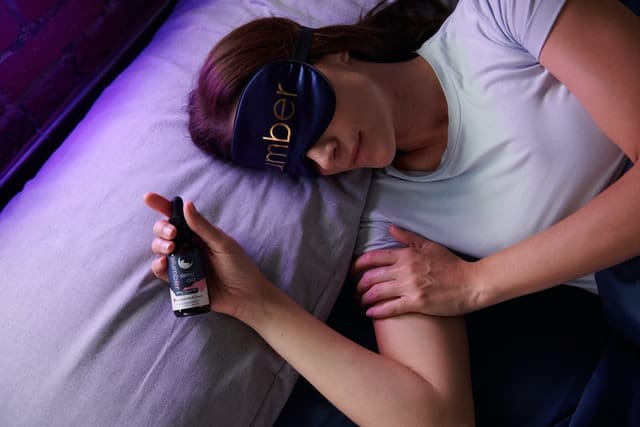Sleep is medicine. A highly powerful, free medicine that most people overlook. Over the years, I’ve shared with countless professionals the immense significance of sleep, and I will continue to do so—because sleep is that essential. Sleep is one of the simplest and most effective ways to enhance productivity, creativity, and overall well-being. Unfortunately, many are still neglecting it.
Table of Contents
Why Sleep is Crucial for Productivity
Sleep is not just a passive process. It is an active, healing time when your body and mind undergo a remarkable transformation. Hormones are balanced, growth hormones are released to repair and rejuvenate your body, and the detoxification process takes place. The brain only detoxifies while you sleep, and it’s during sleep that your body restores its energy reserves.
Think about it: No matter how healthy your diet, how hard you exercise, or how much you meditate, your body cannot fully reap the benefits of these activities unless you are getting proper rest. Sleep is essential for everything to function optimally.
When you sleep:
- Your immune system strengthens and becomes more adept at fighting off infections.
- Your brain clears out toxins and refreshes itself, improving cognitive function.
- Your body repairs and regenerates cells, helping with growth and recovery.
In my experience as a Business Strategist, I’ve worked with clients in various fields—from startups to established enterprises—who struggle with burnout and fatigue, often because of poor sleep. They invest heavily in new business strategies, hiring top talent, or buying the latest tech tools, but overlook one fundamental resource: sleep. If you’re not getting enough sleep, all those efforts can be undermined.
Invaluable Tips to Fix Sleep Deprivation
1. Reset Your Sleep Rhythm
If your sleep patterns have been disrupted due to jet lag, night shifts, or other factors, it’s time to reset. The first step in improving your sleep is to fix a consistent wake-up time. No matter what, set your alarm for the same time each morning. It may be tough initially, but consistency is key to resetting your circadian rhythm.
For example, one of my clients, a tech entrepreneur, struggled with late-night work sessions, often finishing projects at 3 AM. After I advised him to wake up at 7 AM every day, no exceptions, it took a few weeks, but he began to feel more focused and energized, which directly impacted his business performance.
2. Keep Your Room Dark
Eliminate any light in your bedroom. No LED lights, no screen light from your devices. The darker your room, the better your sleep quality. You may even want to try a sleep mask or place a towel over your eyes to block out light.
3. Switch Off Gadgets Before Bed
The blue light emitted by smartphones, laptops, and TVs suppresses melatonin, the hormone responsible for sleep. Make it a rule to turn off all devices at least one hour before bed. This allows your body to prepare for restful sleep.
4. Incorporate Light Exercise Into Your Routine
Exercise not only improves your physical health but also supports better sleep. Aim for 30 minutes of moderate exercise each day. But avoid working out too late in the evening, as it can energize you and disrupt your sleep cycle.
For instance, I advised a sales manager client to switch from late-night gym sessions to morning runs. The result? She felt more energized during the day and experienced deeper, more restorative sleep.
5. Limit Caffeine and Alcohol Intake
Caffeine can stay in your system for up to 6 hours, disrupting your ability to fall asleep. Similarly, while alcohol may initially make you drowsy, it interrupts the deeper stages of sleep. Reduce or eliminate caffeine in the afternoon and evening for better sleep quality.
6. Focus on Diet and Nutrition
Magnesium-rich foods such as almonds, spinach, and bananas can relax the muscles and help promote sleep. Avoid heavy meals right before bed, which can disrupt sleep and cause discomfort.
7. Reduce Stress with Meditation or Deep Breathing
Stress can keep you awake at night, making it difficult to fall asleep. Incorporate relaxation techniques such as meditation or deep breathing before bed. Journaling your thoughts or making a to-do list can also help clear your mind.
Sleep’s Impact on Business Productivity
Lack of sleep doesn’t just harm your health—it also harms your productivity. Here are some common impacts I’ve seen among clients in high-stress, high-demand roles:
- Cognitive Impairment: Sleep-deprived individuals struggle with focus, memory, and decision-making. For instance, a marketing manager once told me that she couldn’t focus during meetings due to fatigue. After improving her sleep, her attention span improved significantly, and so did her work performance.
- Slower Reaction Times: Sleep deprivation can reduce reaction times, leading to costly mistakes in business. I worked with a project manager who constantly made small but significant errors because he was too tired to focus properly. Once his sleep improved, he reduced errors by 40%.
- Creativity Drain: Innovation requires rest. When tired, creativity tends to falter. After implementing better sleep strategies, a creative director in one of my client firms saw a noticeable increase in creative output, boosting his team’s performance by 20%.
- Mood Fluctuations: A lack of sleep leads to irritability and poor decision-making. A senior consultant I coached found that after improving his sleep, his ability to manage client relationships and his leadership style both improved.
Frequently Asked Questions (FAQs)
1. Can loads of coffee be taken to reduce sleep?
Absolutely not. While coffee can temporarily boost energy, relying on caffeine to counteract sleep deprivation is a slippery slope. It’s important to focus on improving your sleep quality, not masking your exhaustion.
2. What is the importance of deep sleep?
Deep sleep is when your body and brain recharge. It is the stage where growth hormones are released, and your immune system repairs itself. Without deep sleep, your body can’t fully regenerate or detoxify.
3. Are sleep medications good for you?
Sleep medications should be used only in emergencies, not as a long-term solution. Natural sleep through good habits is always better for your health. If you’re struggling with sleep, try incorporating relaxation techniques like breathing exercises or yoga before bed.
4. Is melatonin a sleeping pill?
Melatonin is a hormone that helps regulate sleep-wake cycles, but it’s not a sleeping pill. It can help people fall asleep, but should not be relied upon long-term.
Quick Sleep Hacks for Better Productivity
- Track Your Sleep: Use apps like Sleep Cycle or wearables like Fitbit to monitor your sleep patterns and make improvements.
- Use White Noise: If you’re in a noisy environment, a white noise machine can help create the ideal sleep atmosphere.
Final Thoughts: Sleep is Non-Negotiable
As a Business Strategist, I’ve seen firsthand the transformative effects of good sleep on both personal health and professional performance. Sleep is essential for your body to reset, rejuvenate, and perform at its best. No amount of caffeine, energy drinks, or expensive superfoods can replace the power of a good night’s sleep.
If you want to succeed, both personally and professionally, you need to prioritize sleep. So, stop compromising your rest—make it a non-negotiable part of your routine and watch your productivity, creativity, and overall performance soar.
Let’s transform the way we approach sleep, and together, we can build a more energized, productive future.
The Power of Sleep: Essential Tips to Combat Sleep Deprivation for Increased Productivity
By Hirav Shah, Business Strategist & The Game Changer
















